
Always On The Go-Go-Go—September 2017, Canadian Packaging
By Andrew Joseph, Features Editor; Photos by Pierre Longtin
Automation Food Safety General Film Flexibles Plastic Aliments Martel Inc. Pemberton & Associates Inc. slideshow The Martel Group VC999 Packaging Systems Videojet Technologies Canada Ltd. XtraPlast XtraVacQuebec sandwich maker going national with pre-made, pre-packed meals for customers looking for convenience
Caption: (Left to right): VC999 Packaging System Canada vice-president Remi Boudot, Aliments Martel vice-president Serge Martel, and VC999 Packaging System Canada sales/project manager Carl-Michel with examples of the sandwich and sub packs provided by VC999’s equipment.
After spending 24 hours at gaming table around 1762AD, England’s 4th Earl of Sandwich John Montagu requested the establishment’s cook prepare a meal that would allow him to continue playing with one hand, while allowing him to eat with the other.
While the name of that cook is lost to history, the meal of slices of cold beef presented between toasted bread came to be known as a sandwich after the man who requested the nourishing repast.
Of course, it could just as easily been called a ‘portsmouth’ that many North Americans eat for lunch.
The first Earl of Montagu was going to take the title of Earl of Portsmouth, but changed his mind at the last moment to instead honor the town of Sandwich in Kent, England where the fleet he was commanding happened to be offshore from.
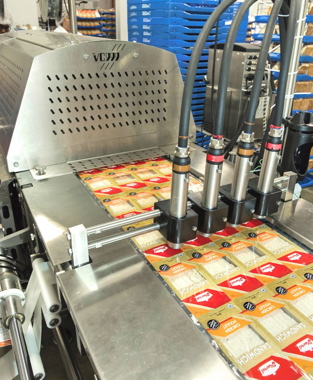
A Videojet inkjet printer mounted to a VC999 i-Series 423 thermoformer applies best-before and lot code data to individual sandwich backs at the Aliments Martel facility in Terrabonne, Que.
Perhaps owing to its high-stakes origin, the sandwich has become known as a meal of convenience and flexibility, as a meal that can be taken and eaten on the go.
Nowadays, the sandwich’s ingredient list has evolved from the Earl’s slices of cold beef—though it is still a very popular standard fare—to a plethora of ingredients too numerous to list, with the addition of butter, margarine and dressings, to the inclusion of fruits and vegetables, meats and fish, and, of course cheeses of every type.
In short, if it can be placed between two slices of bread or toast or bun, it can be turned into an enjoyable portsmouth, er, sandwich that can be enjoyed at breakfast, lunch or dinner and all points in between.
While sandwiches were a popular lunch staple for the brown bagging worker, small local cafes in every North American town would offer a sandwich as a quick, easy-to-make, inexpensive meal alternative to the classic burger or meatloaf orders.
In the more recent past, restaurants and cafes began to turn the humble sandwich into fancy feasts with the consumer eating it up in ever increasing numbers.
Less fancy, but no less satisfying, popular sandwich chains such as Subway and Quiznos began taking a huge bite out of revenues from fast-food franchises, prompting major chains of coffee shops such as Starbucks and Tim Hortons to realize that good coffee and donuts aside, people might also prefer a sandwich as a viable option.
KEEPING IT REAL
This rise of the sandwich trend was noticed by companies that supply the chief ingredients for a sandwich—bread manufacturers and deli meats suppliers—which may have inspired Maple Leaf Foods’
Canada Bread division to pay big bucks in 2009 for the production facility of Quebec’s Aliments Martel Inc., a manufacturer of pre-made packaged sandwiches.
“They only purchased our production facility, not our brand,” Ailments Martel vice-president Serge Martel explained to Canadian Packaging magazine during a recent interview.
“To continue our sandwich-making, we utilized a third-party company to manufacturing our sandwiches for us following our recipes,” he continues, “until we purchased another company in June of 2016 and took back our sandwich-making for ourselves.”
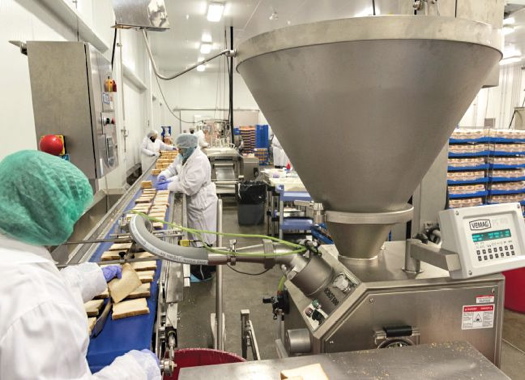
Avoiding excess product layers by human hands, a Reiser Vemag applies a controlled, even layer of meat spread onto a slice of sandwich bread at the Aliments Martel facility.
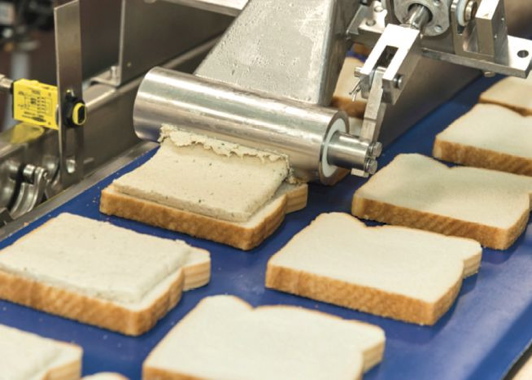
A close-up view of a Reiser Vemag spreading a meat filling on the bottom slice of a bread sandwich on one of Aliments Martel’s four production lines.
The new privately-owned Aliments Martel of Terrabonne, Que. is part of The Martel Group that produces and distributes ready-to-eat meal products such as sandwiches, salads and submarine sandwiches, serving small businesses such as convenience stores and gas stations, as well as large grocery and supermarket chains, club stores and distribution centers.
Martel says that product distribution is done via its own brands of: Martel, Martel Vita (the healthy alternative), Selection Martel; and Relais Frais.
Along with supplying its on-the-go meals to such customers as gasoline provider Esso, Ultramar CST, Sobeys, Couche-Tard—one of the largest convenience store operators in the world with over 12,000 stores across North America, Europe, Japan, China and Indonesia—and MAXI, a Quebec grocery retailer subsidiary of Loblaw Companies, Aliments Martel also provides its food fare menu to institutions such as hospitals, drug stores, cafeterias, daycares, schools, as well as government agencies.
Just one year ago when the company was rebooted, its landscape focus was just the province of Quebec. But now, Martel points out, the federally-inspected 70,000-square-foot facility and its 100 employees has successfully entered the Ontario market, opened a facility in the east coast and is about to expand into western Canada hopefully by the end of the year.
“Approximately 50 percent of our output revolves around the production of sandwiches, 40 percent for submarines, with the remaining 10 percent for salads and other convenience foods,” relates Martel.
He says that Aliments Martel’s bestsellers in its two main categories are the chicken sandwich and the Caesar salad.
“Because of the shelflife dependent nature of our food products, our production facility runs two shifts a day,” says Martel, “as it is imperative we always have fresh products available for our customers to
have on their retail shelves.”
Contained within the HACCP (Hazard analysis and critical control points)-certified facility are five automated sandwich production lines.
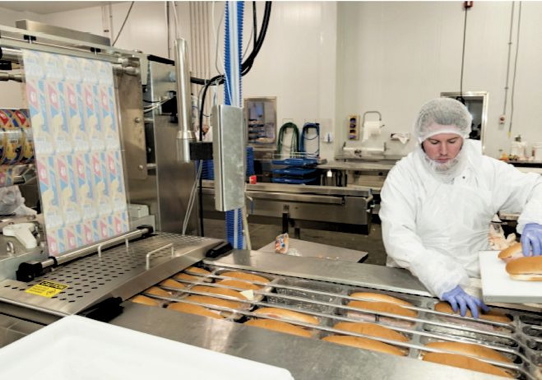
An Aliments Martel employee hand-places sub sandwiches onto the lower pocket of film before being sealed by a VC999 i-Series 459 thermoformer.
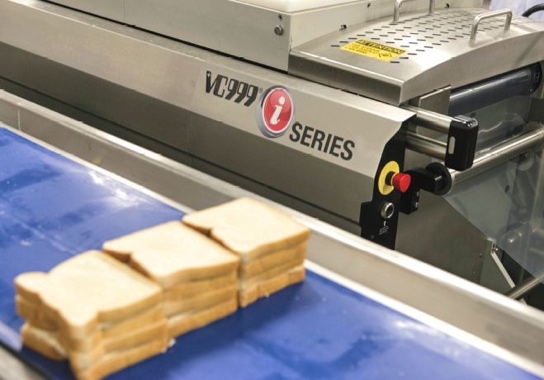
Close-up of sandwiches on a conveyor line, awaiting primary packing via a VC999 i-Series 423 thermoformer with Videojet inkjet printer.
PACKING IT AWAY
Long chubs of meat are placed within various slicing machines that can each portion five chubs at the same time.
These sliced meats are then allowed to fall atop a bottom bread layer with other pre-determined ingredients automatically placed atop it.
“Our five automated production lines producing and packing our sub and sandwiches products are a very efficient process,” says Martel, “that not only helps keep costs down, but has provided us with a production line efficiency that enables us to consistently get our product out to our customers in a timely fashion.”
Each sandwich produced is individually-packed at the Aliments Martel facility by equipment designed and manufactured by VC999 Packaging Systems, a Kansas City-based company manufacturing
packaging machines exported worldwide.
The VC999 brand consists of thermoformers, high-speed traysealers, and vacuum machines; its XtraVac brand offers economical equipment solutions such as flowwrappers, metal detectors, vacuum chamber machines, multihead weighers and more; while its XtraPlast division provides all of its plastic products.
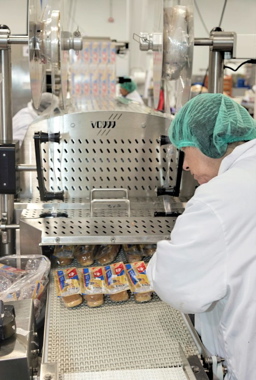
Packs of sealed subs exit the VC999 i-series 459 thermoformer.
When Aliments Martel purchased the business in 2016, along with its facility and employees, it also inherited its older production line equipment it felt would not allow it to be competitive enough for them to grow its business.
“We worked directly with VC999’s sales/project manager Carl-Michel Cloutier to determine the best equipment for our needs,” explains Martel.
“We chose equipment and materials that were of a high quality, but were still not going to break the bank,” he continues. “And after just one year, we contacted VC999 again to make additionalmachine purchases that reflect our current and future requirements.”
In 2016, Aliments Martel installed a pair of VC999 rs-Series model RS323 flexible thermoforming machines with Videojet thermoprinters.
“One of the RS323 units was set up to work with both rigid and flexible materials, while the other just handles flexible,” mentions Martel.
A third VC999 machine installed at that time was a RS355 rigid/flexible thermoforing machine with a Videojet inkjet printer.
The rs-Series of VC999 thermoformers are a robust form-fill-seal vacuum pack machine that forms deep-drawn pockets from rolls of film that allow the processor to place the product within before the rs-Series thermoformer quickly seals multiple packs via vacuum or modified atmosphere at a rate of approximately eight to 10 cycles per minute.
During the first year of the reborn Aliments Martel, sandwiches were still being created by a third-party processor, while the three new rs-Series thermoformers were used to pack complimentary products such as sandwiches, subs, wraps, pita, ribs, burgers, croissants and more.
“All three of the VC999 rs-Series machines exceeded our expectations,” Martel relates. “We knew of the VC999 reputation from talking with other food processing companies, but even we were pleasantly surprised at how easy to use the equipment was, and at the level of service we received from them.”
As such, when it came time for Aliments Martel to expand its automation, Martel says he did not hesitate to once again use the services of VC999.
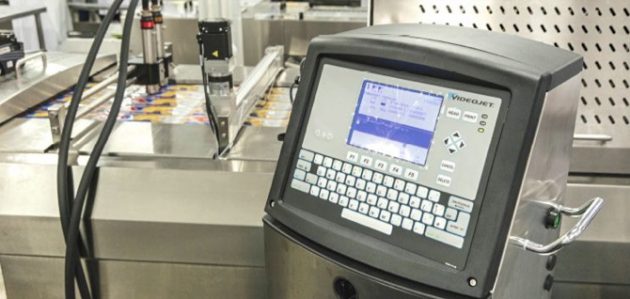
A Videojet inkjet printer applies best-before and lot code data to the top film of the Aliment Martel sub products.
The “I’S” HAVE IT
Installed in 2017, Aliments Martel added a pair of impressive i-Series VC999 machines:
- an i423 rigid/flexible thermoforming machine with a VC999 bottom labeler and two Videojet inkjet printers, mounted on the jumbo roll at the forming unit to limit the number of roll changes required per day, thus enhancing production line efficiency producing sandwiches exclusively;
- an i459 flexible thermoforming machine with two Videojet inkjet printers, also mounted per the i423 unit, producing only subs.
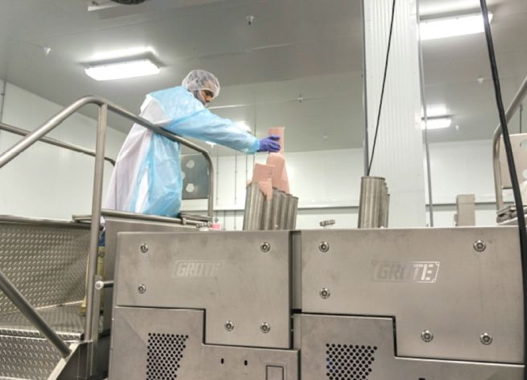
An Aliments Martel employee places chubs of meat into a Grote slicing machine, supplied by Pemberton & Associates Inc.
“We use one to pack only sandwiches, and the other i-Series just for subs,” mentions Martel.
The sandwich maker opted for the new i-Series because it had a situation advantage: Aliments Martel needed a machine to achieve the high speeds it required to meet its unit-per-day output of sandwiches
and subs to match customer demand, and only the i-Series could do that while being able to fit within the remaining limited floorspace.
“Another key reason we opted for the i-Series,” relates Martel, “is that it’s the only such thermoformer that can switch from a rigid MAP application to a regular flex vacuum or MAP application in less than 30 minutes without a mechanical adjustment.
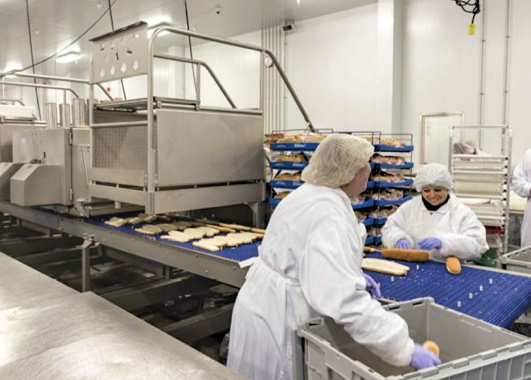
Aliments Martel employees place bread onto a conveyor that moves under a Grote slicing machine that deposits slices of meat onto the open-face sub bread.
The i-Series of thermoformers is designed for medium to large volumes of packing, and features the high-quality hygienic standards of VC999, with Cloutier saying its designs exceed global standards.
According to VC999’s Cloutier, the i-Series is constructed with an extra-strong fabrication of stainless steel to handle the daily, heavy-duty application process.
“Along with being fast, the quality of seal on the i-Series is delivered with a 50-tons of pressure die lift system that Serge Martel wanted to ensure the company would have very few rejects,” recalls Cloutier.
“We also equipped VC999 labelers and printers at the end of the line so that the package is complete with all the required labels and lot numbers and best-before data,” he adds.
Martel notes that its two i-Series thermoformers each work at a rate of 10-12 cycles per minutes which “is pretty fast considering we are forming deep packs with thick rigid films and MAP.”
Cloutier adds that VC999 also worked on redesigning some of the other equipment around the thermoformers to bring products quicker to the machine.
Although Aliments Martel opted to go with an all-VC999 line-up for its five production lines, the VC999 machines are designed to be flexible enough to be integrated with other brands as well.
“The VC999 equipment has an excellent reputation for quality, high-speed output, but we were also swayed by their fast and high-quality service,” says Martel, noting the one-stop complete offer. “Their ability to not only provide the machine, but the films required from a single supplier helped when they also opted to pick a maintenance program from VC999 that revolved around their choice of XtraPlast high-quality films.”
Adds Cloutier: “VC999 also developed a complete concept of final package from machine, film and artwork development of images to go on the pre-printed films.
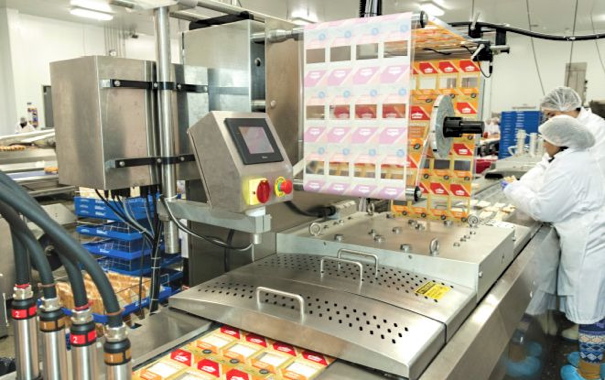
Workers place two halves of a sandwich into each lower film pocket before a VC999 i-Series 423 thermoformer applies a top layer of film to seal it. An attached Videojet inkjet printer then applies lotcode information and best-before date onto each pack of chicken sandwich.
X MARKS THE SPOT
“As well, we offered Aliments Martel our complete expertise in packaging line development, including engineering, equipment choice, best film options, graphic design and even after sales,” says Cloutier.
The plastic films used by Aliments Martel on its five VC999 production lines is from the XtraPlast division:
- XtraPlast Rigidex Forming web films: 14-mil to 18-mil used depending on the type of product being packed;
- XtraPlast Aquasun Flexible Forming 9-mil film;
- XtraPlast Aquasun Flexible Non Forming Easy Peel 2.4mil film, printed via high-resolution rotogravure 11-colors, Cloutier says.
“At this time, none of the salads at Aliments Martel are being packed via VC999 equipment,” acknowledges Martel. “It’s all subs, sandwiches, and handheld breaded products.”
He says that all of the VC999 thermoformers at Martel are working in MAP (modified atmosphere packaging) mode.
“Utilizing MAP with our thermoformers has given our sandwiches a shelflife of 30 days using a vacuum of 1-mbar (an atmospheric measurement known as millibar) with an oxygen gas residual of less than
one percent.
Aliments Martel also uses a VC999 XtraVac flowwrapper—a special design flowwrapper that can use a shrinkfilm without gas, as well as a regular laminated high barrier film should gas be required for a
longer shelflife.
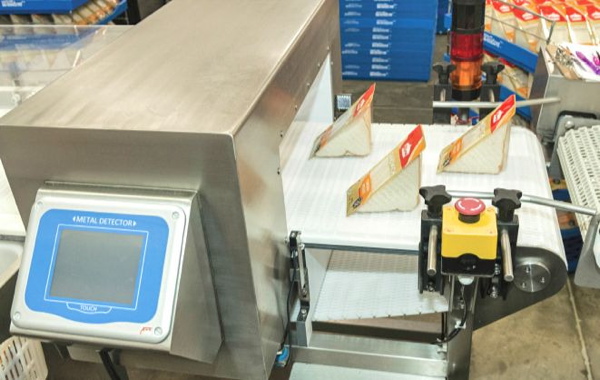
A VC999 XtraVac Metal Detector 4121 unit inspecting individual sandwich packs sealed by a VC999 thermoformer.
Other VC999 XtraVac equipment purchased by Aliments Martel are:
- three MD4121 metal detection systems;
- three MD3113 metal detection units;
- one FW50 flowwrapper for shrink and regular films;
- one CS501M casesealer;
- one PS1521 automatic pallet stretchwrapper machine;
- and two rotary tables.
Aliments Martel is also a participant within the VC999 XtraPlast Rewards program where every plastic product purchased rewards them with points that can be exchanged for free maintenance, service or free parts for their owned machinery.
“The past couple of years have been a whirlwind of activity for us,” exclaims Martel.
“The new business venture has been quite successful,” he says, “which is why we are expanding our customer base right across Canada.
“That success is derived from the tasty, affordable, quality on-the-go products we offer our customers, coupled with our on-time delivery.”
He says that on-time achievement is owing to his hardworking employees and to the high-quality automation on his five production lines.
“We are very happy with our business partnership with VC999,” sums up Martel. “Working with the VC999 Canada team has helped make our production line an efficient beast.
“Everything works well—better than what we expected, which has helped us quickly reach our goal of having our sandwich products across Canada.”
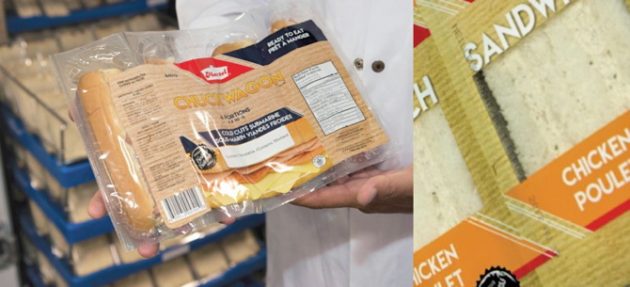
A Martel family-pack of four individual cold cut submarine sandwiches packed at the Aliments Martel facility (left). A close-up of a chicken sandwich pack (right).
Advertisement

